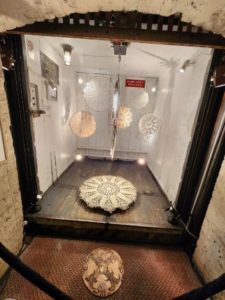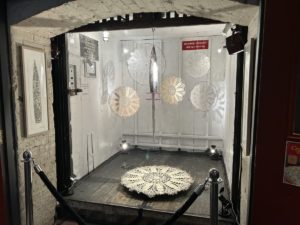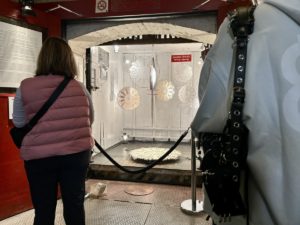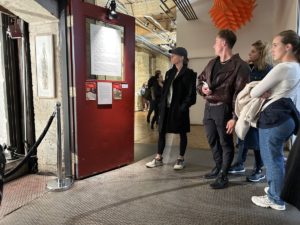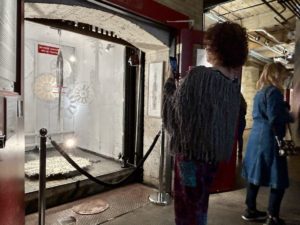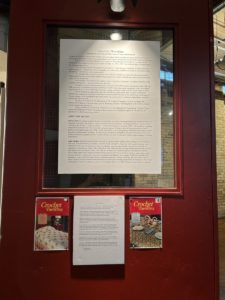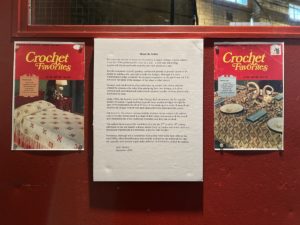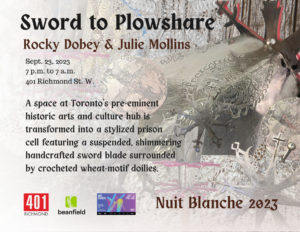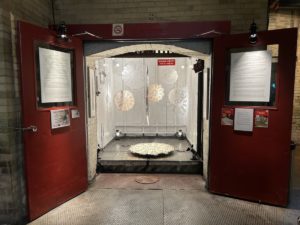
TORONTO (Sept. 10, 2023) – A space at Toronto’s pre-eminent historic arts and culture hub is transformed into a stylized prison cell featuring a suspended, shimmering handcrafted sword blade surrounded by crocheted wheat-motif doilies.
Rocky Dobey and Julie Mollins, co-creators of the temporary art installation on show at 401 Richmond from sunset on Sept. 23 to sunrise on Sept. 24, 2023, offer viewers the chance to contemplate the consequences of war.
The biblical reference to swords and plowshares — the timeworn challenge to end conflict and establish peace — reflects humanity’s struggles over land tenure and how concepts of ownership distort our ability to build sustainable communities.
The installation alludes to the Russia-Ukraine war which has disrupted trade in wheat and other key commodities and is having a profound impact on food value chains and the soaring cost of living worldwide.
The war hits close to home for Dobey, one of 1.4 million Canadians — roughly 4 percent of the country’s population — claiming Ukrainian ancestry. Canada’s western wheat-growing areas attracted waves of Ukrainian immigrants in the 19th and 20th centuries. Canada has accepted more than 175,000 Ukrainians under emergency travel provisions since the Russian invasion of Ukraine last year, a sharp escalation of the conflict which began in 2014.
While creating art and craft on the side, Mollins has spent more than 10 years working for international organizations in journalism and communications focused on the interlinked challenges of climate change, land degradation and biodiversity loss, particularly in relation to agriculture, tropical forests and food security.
Sword to Plowshare at 401 Richmond St W is part of Toronto’s overnight art festival Nuit Blanche. The theme this year is “Breaking Ground,” featuring ideas to do with the natural world, change and innovation.
Dobey and Mollins previously collaborated for Nuit Blanche 2017, producing “Casting Yarns: Forest-Street Disequilibrium,” designed to draw attention to the harsher aspects of city life and the potential for rebirth amid urban decay.
About the artists
Rocky Dobey’s artistic practice focuses on redefining the urban environment through a political lens. He typically articulates his vision in street art and political posters (ie: “Anti-globalization – Quebec 2000;” “Reclaim the Streets;” “Prison Justice;” “Anarchist Gathering – Toronto 1988”). He has been installing street art in Toronto and other Canadian cities for almost 40 years, since he began producing street posters and graffiti in the mid-1970s. In the mid-1980s, he installed painted billboards depicting political parodies on abandoned buildings. He has installed concrete sculptures, street-post mounted books and political historical plaques around Toronto streets. His most recent art is etched copper plaques bolted to street posts.
Web: rockydobey.wordpress.com; Instagram: @rockyzenyk
Julie Mollins formerly produced art and craft as a prop builder and jeweller working at the Stratford Festival, National Ballet of Canada, Canadian Stage and other companies. Her pastel drawings were exhibited at the Casa de Cultura in Texcoco, Mexico, and her photographs appeared in a group art exhibition at the former Gallery 96 in Stratford, Ont. Although she is acting independently in this context and represents only herself, since 2020, she has worked as a communications consultant for several World Bank agriculture and environment projects focused on food systems, land use, aquaculture and natural resources. Previously, she was a journalist with Reuters news agency in Toronto and the UK, including a stint with the former Reuters humanitarian news website AlertNet. She was also a writer-editor at the Center for International Forestry Research and World Agroforestry in Indonesia, the Global Landscapes Forum in Germany, and the International Maize and Wheat Improvement Center in Mexico.
Web: www.julie-mollins.com; X: @jmollins; Instagram: @julie.mollins; Mastodon: @julie

